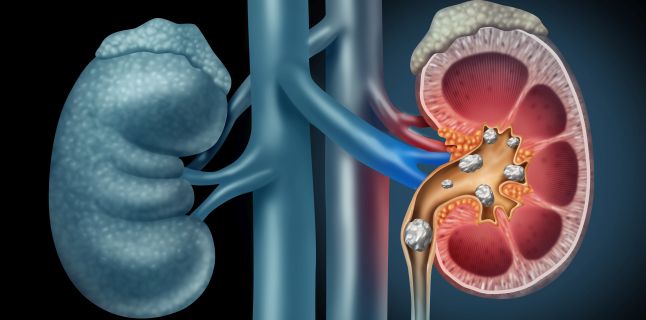Do you have kidney stones?

Most times, kidney stones do not give symptoms unless they move, that is, if they do not move in the kidneys. Severe pain is called and felt only when the stones are moving. In men, the pain can radiate to the inguinal area. Here are the symptoms that are possible: • The presence of acute pain, strong backwards under the ribs, pain that radiates to the lower abdomen, • Pain is periodic, cyclic, • Pain in urination, • Blood presence in urine, • Urine may have color . Usually, kidney stones are formed when the urine contains several substances that create crystals - such as calcium, oxalate and. • Family history.
If a family member has kidney stones, it increases the risk of doing you too. Or if you already had a stone, it is possible that you will do more in the future. • Dehydration. If you do not consume enough water, you increase the risk of kidney stones. People who live in warm and hot climates may be at greater risk.
• Some diets. Consumption of foods rich in protein, sodium (salt) and sugar may increase the risk of certain types of kidney stones. This is especially true with a diet rich in sodium. For example, eating a lot of salt increases the amount the kidneys need to filter and significantly increases the risk of kidney stones. • Obesity.
Increased body mass index (BMI), large waist size and weight gain were associated with an increased risk of kidney stones. • Inflammatory bowel disease or may cause changes in the digestive process that affect calcium and water absorption, increasing the risk of kidney stones. There are several types of treatment of kidney stones, the treatment being closely related to the size and location of the stone. Thus, if the stone is small, the doctor can tell the patient to drink plenty of water that can help, and if pain occurs, you can prescribe painkillers. There is also a shock wave treatment -.
Practically, with the help of an appliance, shock waves will break the stone into small pieces, which are later removed naturally through the urine. Also, there is surgical surgery that can remove larger kidney stones. It is very important for the stone to be sent to the lab for investigations, thus determining her type, and the doctor will prescribe a certain lifestyle to help the patient not to make other stones. .
Source : sfatulmedicului.ro
Views : 2974
Popular Article
- (photo) Nude becomes art.
Posted: 2018-03-17, 9809 views.
- The harmful effects of air conditioning on the skin
Posted: 2017-06-08, 8517 views.
- 3 causes of dyed hair discoloration
Posted: 2017-06-15, 8401 views.
- Why early puberty occurs in girls: symptoms, favors, diagnosis and treatment
Posted: 2017-10-24, 8242 views.
- Good or bad skin treatments in the hot season
Posted: 2017-06-07, 7975 views.
Recommendations
- (photo) Nude becomes art.
Posted: 2018-03-17, 9809 views.
- The harmful effects of air conditioning on the skin
Posted: 2017-06-08, 8517 views.
- 3 causes of dyed hair discoloration
Posted: 2017-06-15, 8401 views.
- Good or bad skin treatments in the hot season
Posted: 2017-06-07, 7975 views.
- Risks of practicing sports on hot days
Posted: 2017-06-12, 7547 views.
 4 effective ingredients in the fight against acne.
4 effective ingredients in the fight against acne. How to get rid of hiccups fast
How to get rid of hiccups fast The wheat bran diet: the secret of lost pounds as if by magic
The wheat bran diet: the secret of lost pounds as if by magic The recipe that will sweeten your soul this weekend!
The recipe that will sweeten your soul this weekend!  Is it dangerous or not to refreeze meat after thawing it?
Is it dangerous or not to refreeze meat after thawing it?  The unusual sign of diabetes indicated by saliva.
The unusual sign of diabetes indicated by saliva. What to drink to boost your immune system.
What to drink to boost your immune system. 10 foods that help you never age.
10 foods that help you never age. What actually happens in your body if you drink a cup of coffee for breakfast
What actually happens in your body if you drink a cup of coffee for breakfast 5 surprising benefits of chia seeds
5 surprising benefits of chia seeds